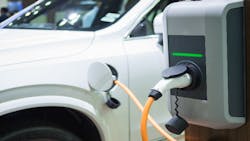TravelCenters of America Survey: C&I fleet owners hesitant about EVs until Infrastructure catches up
U.S. commercial fleet owners are committing to a future with cleaner-emitting vehicles, but they are not ready to completely invest until charging and fuel-cell infrastructure are ubiquitous, according to a new survey of the industry.
TravelCenters of America, a full-service truck stop and travel center company, has released a new survey on sustainable fuel investment by trucking firms.
The survey is part of a white paper, called “Sustainable Fuels in Trucking: The Greening of America’s Trucking Industry.”
As per the white paper, which is the first in a series on the trucking industry’s transition to sustainable fuels, has outlined the key challenges faced by the industry and the federal and state support the industry will need for the transition.
It was found that many companies were hesitant to commit to alternative energy vehicles until the infrastructure and technology had matured enough to maintain efficient operations during and after transition.
The survey found that one in five companies have some EVs in their fleet and about half expect to add EVs to their fleet by 2030. Most of the companies surveyed expect EV trucks to represent 11% to 25% of their fleet by 2030. Very few companies expressed interest in adding vehicles powered by renewable natural gas or liquefied natural gas.
A total of 9% of the respondents said they have CNG vehicles and very few of the companies expect CNG vehicles to make up a large percentage of their fleets by 2030. Only 5% of the respondents said they have hydrogen vehicles in their fleet they expect the percentage to increase to almost 25% by 2030.
Trucking fleet leaders expect TravelCenters of America to take a lead role in providing sustainable fuels. The chain's alternative fuels map shows a small, but extended network of facilities for EVs, hydrogen, liquified natural gas and Tesla SuperChargers.
Commercial, industrial and government fleets making moves, both speedy and deliberate, toward carbon-free vehicles include Xcel Energy, Fedex, Sysco, Michigan State University, the U.S. Army, McDonald's, Penske and US Foods, among many others.
The global electric commercial vehicle market could grow 25 percent annually to $258 billion in value by 2027, according to a forecast by Mordor Intelligence.
About the Author
EnergyTech Staff
Rod Walton is head of content for EnergyTech.com. He has spent 17 years covering the energy industry as a newspaper and trade journalist.
Walton formerly was energy writer and business editor at the Tulsa World. Later, he spent six years covering the electricity power sector for Pennwell and Clarion Events. He joined Endeavor and EnergyTech in November 2021.
He can be reached at [email protected].
EnergyTech is focused on the mission critical and large-scale energy users and their sustainability and resiliency goals. These include the commercial and industrial sectors, as well as the military, universities, data centers and microgrids.
Many large-scale energy users such as Fortune 500 companies, and mission-critical users such as military bases, universities, healthcare facilities, public safety and data centers, shifting their energy priorities to reach net-zero carbon goals within the coming decades. These include plans for renewable energy power purchase agreements, but also on-site resiliency projects such as microgrids, combined heat and power, rooftop solar, energy storage, digitalization and building efficiency upgrades.
